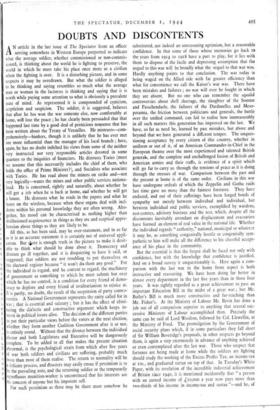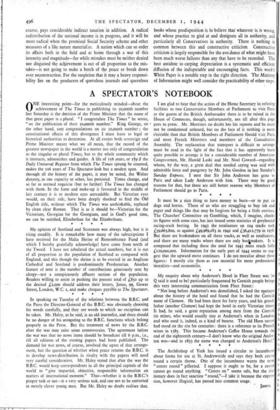DOUBTS AND DISCONTENTS
AN article in the last issue of The Spectator from an officer serving somewhere in Western Europe purported to indicate what the average soldier, whether commissioned or non-commis- sioned, is thinking about the world he is fighting to preserve, the world in which he must take his place once more as a civilian when the fighting is over. It is a disturbing picture, and in some respects it may be overdrawn. But what the soldier is alleged to be dunking and saying resembles so much what the average man or woman in the factories is thinking and saying that it is worth while paying some attention to what is obviously a prevalent state of mind. As represented it is compounded of cynicism, scepticism and suspicion. The soldier, it is suggested, believes that after he has won the war someone else, now comfortably at home, will lose the peace ; he has clearly been persuaded that that happened last time by a good deal of pernicious nonsense that has been written about the Treaty of Versailles. He mistrusts—com- prehensively—bankers, though it is unlikely that he has ever met one more influential than the manager of his local branch ; here, again, he has no doubt imbibed his views from some of the neither very instructed nor very 'responsible articles devoted in some quarters to the iniquities of financiers. He distrusts Tories (must we assume that this necessarily includes the chief of them, who holds the office of Prime Minister?), and Socialists who associate with Tories. He has read about the miners on strike and—not very logically—wants the mines and other public services nationa- lised. He is concerned, rightly and naturally, about whether he will get a job when he is back at home, and whether he will get 3 house. He distrusts what he reads in the papers and what he hears on the wireless, because when these organs deal with inci- dents within his personal knowledge they are often wrong. Alto- gether, his mood can be characterised as nothing higher than disillusioned acquiescence in things as they are and sceptical appre- hension about things as they are likely to be.
All this, as has been said, may be over-statement, and in so far as it is an accurate statement it is certainly not of universal appli- cation. But there is enough truth in the picture to make it desir- able to think what should be done about it. Democracy and distrust go ill together, and it is disquieting to have it said, or suggested, that soldiers are not troubling to put themselves on the electoral register because " it won't do them any good." For the individual to regard, and be content to regard, the machinery of government as something to which he must submit but over which he has no control, is a condition for every friend of demo- cracy to deplore and every friend of totalitarianism to rejoice at. It is partly, no doubt, the result of the suspension of party contro- versies. A National Government represents the unity called for in war ; that is essential and salutary ; but.it has the effect of elimi- nating the dialectic and constructive argument which keeps in- terest in political issues alive. The decision of the different parties to put their particular views before the voters at the next election, whether they form another Coalition Government after it or not, is entirely sound. Without that the divorce between the individual elector and both Legislature and Executive will be dangerously complete. To be added to all that makes the present situation abnormal, is the psychological strain from which after five years of war both soldiers and civilians are suffering, probably much more than most of them realise. The return to normality will be a delicate process, and disasters may easily ensue if pessimism is to be the prevailing note, and the returning soldier or the temporarily superfluous munition-worker is unconvinced that his interests are the concern of anyone but his impotent self.
For such pessimism as there may be there must somehow be substituted, not indeed an unreasoning optimism, but a reasonable confidence. In that some of those whose memories go back to the years from 1914 to 1918 have a part to play, for it lies with them to dispose of the facile and depressing assumption that the sequel to this war will be broadly what the sequel to that war was. Hardly anything points to that conclusion. The war today is being waged on the Allied side with far greater efficiency than what for convenience we call the Kaiser's war was. There have been mistakes and failures ; no war will ever be fought in which they are absent. But no one who can remember the squalid controversies about shell shortage, the slaughter of the Somme and Passchendaele, the failures of the Dardanelles and Meso- potamia, the friction between politicians and generals, the battle over the unified command, can fail to realise how immeasurably - in all such matters this generation has improved on the last. We have, so far as need be, learned by past mistakes, but above and beyond that we have generated a different temper. The unques- tioning acceptance by every citizen of this country, whether in uniform or out of it, of an American Commander-in-Chief in the European theatre over the most experienced and talented British generale, and the complete and unchallenged fusion of British and American armies and their staffs, is evidence of a spirit which will go far to carry us through the tensions of peace as it is doing through the stresses of war. Comparison between the past and the present at home is of the same order. Civilians in this war have undergone ordeals of which the Zeppelin and Gotha raids last time gave no more than the faintest foretaste. They have endured, and out of their sufferings have been forged bonds of sympathy not merely between individual and individual, but between individual and public services, exemplified by wardens, rest-centres, advisory bureaux and the rest, which, despite all the discontents inevitably attendant on displacement and evacuation have formed an element of real value in the national life. Whether the individual regards " authority," national, municipal or whatever it may be, as something congenitally hostile or congenitally sym- pathetic to him will make all the difference to his cheerful accept- ance of his place in the community.
But the essential is that the future shall be faced not only with confidence, but with the knowledge that confidence is justified. And on a broad survey it unquestionably is. Here again a com- parison with the last war in the home front aspect is both instructive and reassuring. We have been doing far better in almost every department in the last five years than in those four years. It was rightly regarded as a great achievement to pass an important Education Bill in the midst of a great war ; but Mr. Butler's Bill is much more constructive and far-reaching than Mr. Fisher's. At the Ministry of Labour Mr. Bevin has done a job out of all comparison superior to anything that several suc- cessive Ministers of Labour accomplished then. Precisely the same can be said of Lord Woolton, followed by Col. Llewellin, at the Ministry of Food. The promulgation by the Government of social security plans which, if in some particulars they fall short of Sir William Beveridge's proposals, in other respects go beyond them, is again a step enormously in advance of anything achieved or even contemplated after the last war. Those who suspect that fortunes are being made at home while the soldiers are fighting should study the working of the Excess Profits Tax, an income-tax at Jos., and graduated surtax on top of that. In Tuesday's White Paper, with its revelation of the incredible industrial achievement of Britain since 194o, it is mentioned incidentally that " a person with an earned income of Lio,000 a year now pays more than two-thirds of his income in income-tax and surtax "—and he, of course, pays considerable indirect taxation in addition. A radical redistribution of the national income is in progress, and it will be more radical when the promised Social Security scheme and other measures of a like nature materialise. A nation which can so order its affairs both in the field and at home through a war of this intensity and magnitude—for while mistakes must be neither denied nor disguised the achievement is out of all proportion to the mis- takes—is not going to make a botch of the peace or break down over reconstruction. For the suspicion that it may a heavy responsi- bility lies on the producers of querulous journals and querulous books whose predisposition is io believe that whatever is is wrong, and whose practice to gird at and denigrate all in authority, and particularly all Conservatives in authority. There is nothing in common between this and constructive criticism. Constructive criticism is largely responsible for the avoidance of what might have been much worse failures than any that have to be recorded. The best antidote to carping depreciation is a systematic and efficient diffusion of the indisputable and encouraging facts. This week's White Paper is a notable step in the right direction. The Ministry of Information might well consider the practicability of other steps.



























 Previous page
Previous page